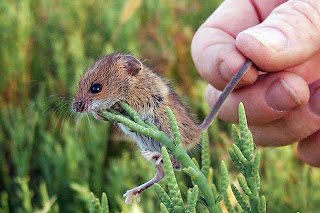

|
Pelosi sets aside $16.1M of Stimulus money to restore Bay Area mouse habitat
 Anyone driving around SF Bay on congested freeways full of pot holes can feel proud because at least the local varmints are comfortable. Anyone driving around SF Bay on congested freeways full of pot holes can feel proud because at least the local varmints are comfortable.The tiny mouse that became a hotly disputed symbol of wasteful spending in the $787 billion economic stimulus bill has returned to pester House Speaker Nancy Pelosi. The Obama administration revealed last week that as much as $16.1 million from the stimulus program is going to save the San Francisco Bay Area habitat of, among other things, the endangered salt marsh harvest mouse. That has revived Republican criticism that the pet project was an "invisible earmark" in the massive spending bill for Mrs. Pelosi, whose San Francisco district abuts the Bay, and epitomizes what Republicans say is the failure of stimulus spending so far to help an economy still shedding jobs. "Lo and behold, the government has announced that the mouse is getting its money after all," House Minority Leader John A. Boehner, Ohio Republican, said, standing beside a poster of the furry varmint. "Speaker Pelosi must be so proud." Mrs. Pelosi's office was quick to dismiss the criticism. Pelosi spokesman Drew Hammill called the attack on the mouse "a tired and tried tale of Republican desperation," noting that the mouse was never mentioned in the legislation and the project competed with other restoration jobs for stimulus dollars. Mr. Hammill said the Bay project benefited both the economy and the ecosystem. "Wetlands restoration projects, such as this one, not only create jobs, but improve the environment," he said. "Wetlands filter contaminants from the waters of the Bay, protect our shores against sea level rise, and provide habitat for a myriad of wildlife, including several endangered species." He stressed that the salt marshes are not in the speaker's urban district and the harvest mouse never inhabited the city. Two San Francisco Bay Area projects were among 50 marine and coastal habitat restoration projects undertaken by the National Oceanic and Atmospheric Administration with $167 million from the stimulus, dubbed the American Recovery and Reinvestment Act of 2009. About $7.6 million went to restore more than 1,990 acres comprising three former salt ponds in the southern end of San Francisco Bay and $8.5 million went to restore wetlands in American Canyon salt pond, also in the Bay Area. The Commerce Department, which oversees NOAA, said the 50 projects were chosen from a pool of 814 proposals totaling more than $3 billion in requests. The agency said it worked through a rigorous selection process to identify and set priorities for projects meeting the stimulus law's criteria. However, even prior to the stimulus vote, Republican lawmakers said NOAA was indicating that saving the harvest mouse would be a top priority for any stimulus money it received. Posted by: GolfBravoUSMC 2009-07-10 |
| http://www.rantburg.com/poparticle.php?ID=274041 |